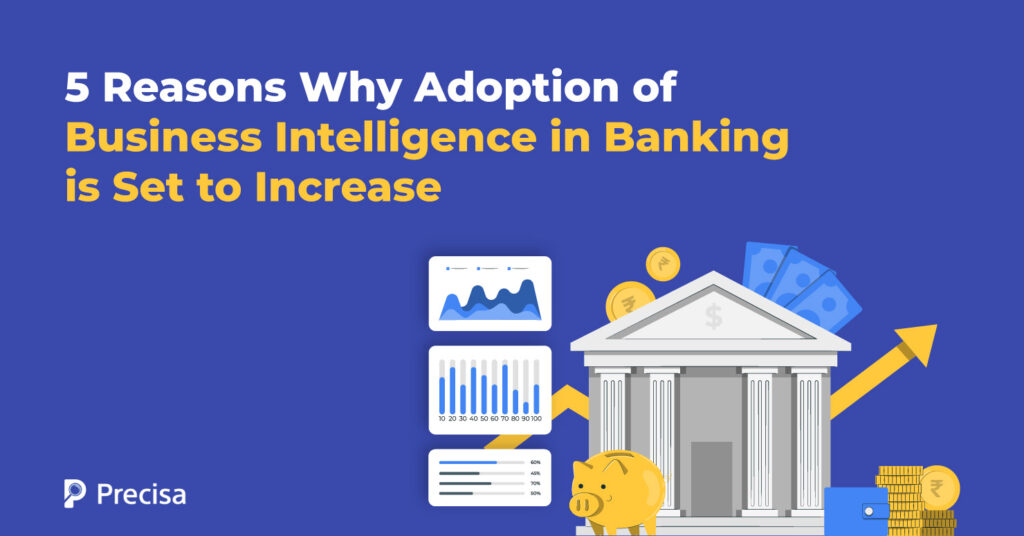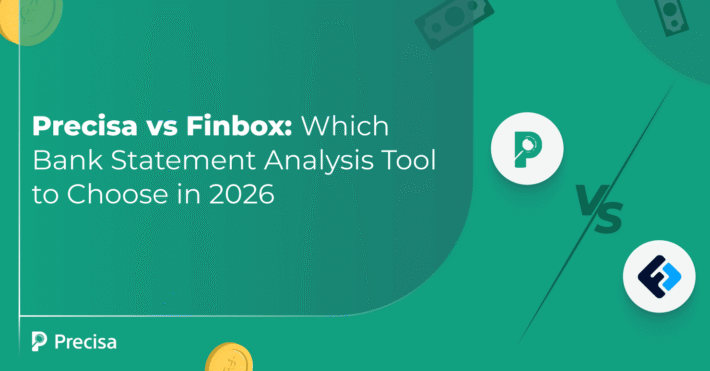5 Reasons Why Adoption of Business Intelligence in Banking is Set to Increase

Banks have a unique opportunity to leverage new technologies and digital tools to enhance customer experiences and drive innovation in the financial industry.
By embracing emerging trends like personalised financial products, spend analytics and cash forecasting, banks can stay ahead of the curve and continue to meet the evolving needs of their customers. The increasing competition from Fintech companies also presents a chance for collaboration and partnerships, fostering a vibrant and dynamic financial ecosystem.
Many forward-thinking banks are also increasingly recognising the power of data-driven decision-making. Business intelligence in banking is emerging as a transformative force, offering banks unprecedented insights into their operations, customer behaviours, and market trends.
In this blog post, we explore how business intelligence in banking can bring more growth, efficiency, and customer satisfaction.
Business Intelligence in Banking: The Need for a Change
Traditionally, conventional financial institutions including banks have been at the forefront of steering the Indian economy and aiding the economic growth and aspirations of millions across the country for decades. However, as mentioned before, banks have often struggled to adopt new technologies and digital tools to fast-track and streamline their processes and acquire new customers.
Fintech companies backed by venture capitalists (VCs) and favourable government initiatives capitalised on the looming gaps in the banking system to carve their place in the financial services ecosystem.
For instance, Fintech startups have revolutionised digital payment in India and while at it, also acquired a significant number of customers. While most banks mostly stayed away from the digital payments space, Fintechs grabbed the opportunity to make their presence felt and acquire customers.
As the Indian market became increasingly flooded with Fintech companies, banks realised the need to craft and implement new strategies to acquire and retain customers.
In this scenario, business intelligence in banking gradually became pivotal to staying competitive, understanding the pulse of consumers, streamlining operations, and building tailored solutions.
To illustrate this with an example: by analysing transaction data, a bank’s BI tool might identify that a group of customers frequently dine at high-end restaurants. The bank could then create a premium credit card with exclusive dining rewards, tailored to meet the specific needs of that customer segment.
More on that in the next section.
Business Intelligence in Banking: An Overview

Business intelligence, also referred to as BI, is an important tool used across different industries to collect, transform, and utilise data to make informed decisions. Let’s take a look at how and why banks must harness the potential of analytics or business intelligence to stay competitive.
Automating Customer Service
Nationalised banks have historically prioritised stability and security over customer service innovations. However, there is a compelling demand for improvement, especially among millennials and Gen Zs who seek convenience and quality services.
Business intelligence techniques including natural language processing (NLP) allow banks to automate customer service with the help of voice-based assistants, automatically generated emails, and chatbots.
These AI-powered solutions understand customer intent through these conversations and respond within seconds, paving the way for quick and timely customer service and improved customer experience and satisfaction.
Enhanced Portfolio Management
Business intelligence in banking can also help portfolio managers make informed investment decisions based on historical and current data. These tools harness crucial data to identify trends and help portfolio managers craft accurate and tailored investment strategies.
Better Operational Efficiency
While trimming costs is important, optimising resources is equally important to ensure optimal operational efficiency. Operational efficiency in banks that have proactively deployed business intelligence tools has increased by as much as 20%, highlighting the importance of analytics in the financial sector.
Business intelligence in banking offers a 360-degree view of different operations, resource allocation, and areas that need to improve. This information allows banks to streamline their internal processes and thereby serve customers effectively.
Strengthen Foothold in the Financial Sector
With 12 nationalised banks and more than 90 public and private sector banks in the country, it is safe to say that there is fierce competition in the Indian banking sector.
Additionally, banks also have to compete with over 2000 Indian Fintech companies that are aggressively trying to acquire customers with smart marketing tactics and new innovative financial instruments.
As a result, banks have lost their mass appeal and are no longer the go-to alternative for a significant chunk of the Indian population. Business intelligence in banking empowers banks to stay abreast with the latest consumer trends and evaluate their competitor’s product offerings, and leverage precious insights to stay ahead of the curve.
Fraud Prevention and Risk Management
The Indian banking system lost around Rs 13,900 crore due to fraud in FY 23-24. Although the amount has nearly halved from FY 22-23, bank-related frauds continue to hurt the credibility of Indian banks.
Business intelligence solutions help banks identify payment discrepancies, detect suspicious debit and credit card transactions, and more importantly, draw patterns to facilitate effective risk management.
These solutions are developed to tackle any attempts made by scammers and fraudsters and safeguard sensitive customer data and financial assets.
Parting Notes
It is clear that business intelligence in banking offers numerous benefits and has the potential to address some of the biggest challenges in the banking industry. These areas include attaining optimal operational efficiency, customer acquisition, customer support, and safeguarding sensitive data.
As more and more banks realise the value of business intelligence and transition toward a digital landscape, it is safe to assume that the adoption of business intelligence in banking will increase and soon become a standard practice.
Precisa’s cutting-edge financial analytics tools including bank statement analysis and credit report analysis equip our clients with real-time insights into their customer’s financial health and monitor other important metrics including debt levels, spending behaviour, and more.
Book your free demo today to know more!



